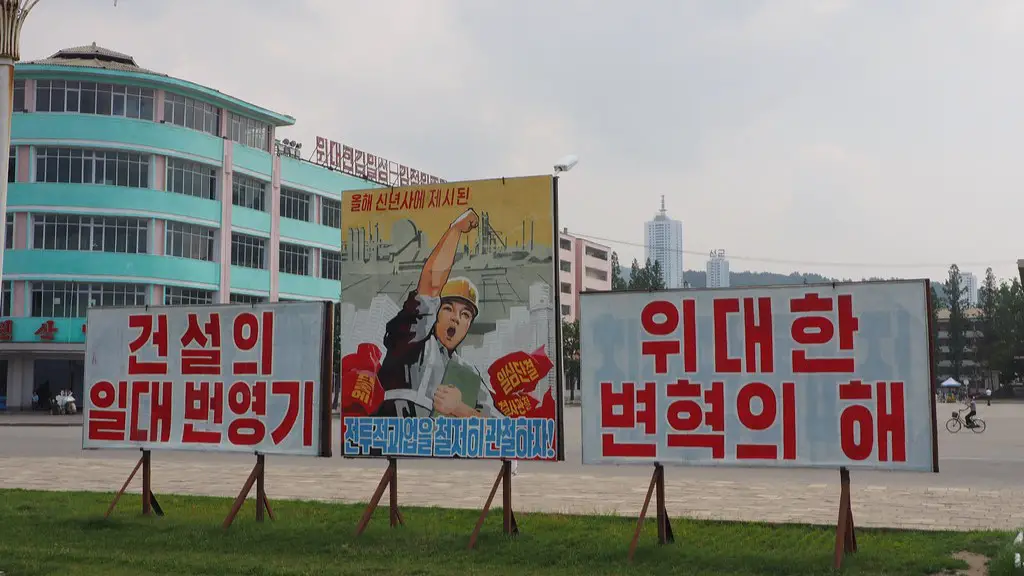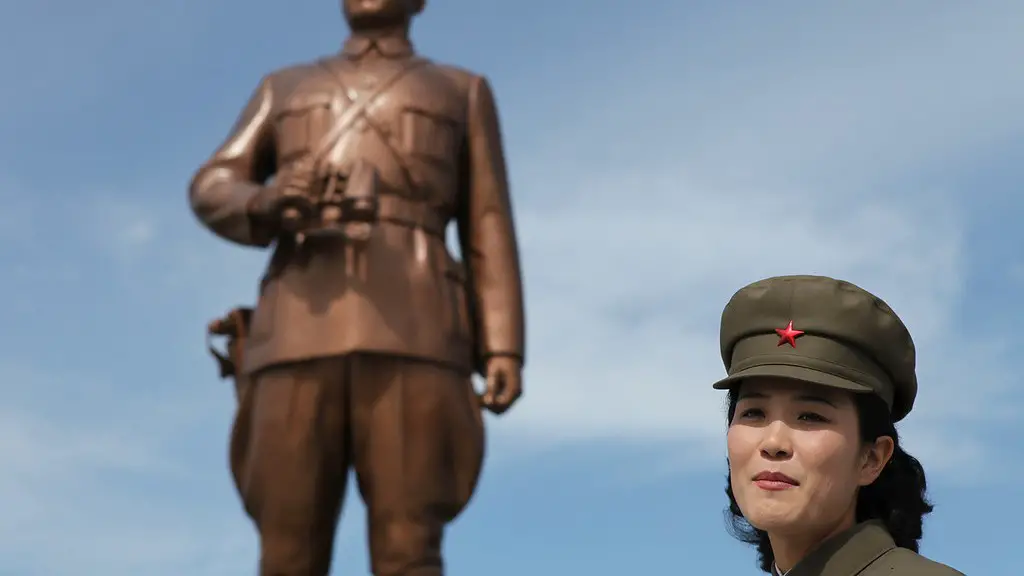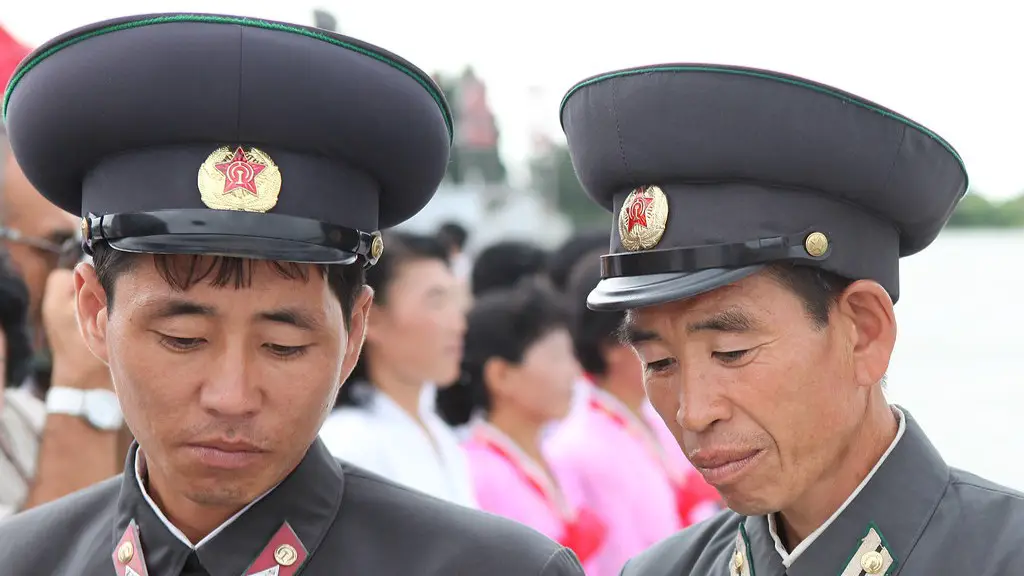Background
North Korea, officially known as the Democratic People’s Republic of Korea (DPRK), is a country located in East Asia bordered by Russia, China and South Korea. Since its creation in the aftermath of the Korean War in 1950, the North Korean government has become increasingly isolated and reclusive. Shortly after the war ended, it became increasingly apparent that North Korea’s oppressive and authoritarian regime was a major hindrance to progress and development. This has resulted in North Korea becoming one of the most restricted and isolated countries in the world.
The government of North Korea is one of the most repressive and authoritarian in the world and has been accused of numerous human rights violations by multiple international organizations. Currently, the country is ruled by Kim Jong Un, the third generation leader of the Kim dynasty. His government has continued to tighten the grip of control on the population by means of widespread surveillance, censorship, and arrest and detainment of perceived dissidents. In addition, the North Korean government limits access to information by restricting communication with the outside world and prevents its citizens from leaving the country.
Reasons
The primary reason behind North Korea’s extreme restrictions is its ambition to maintain a self-sustaining economy and political system. To achieve this, the North Korean government has limited access to finances and material goods, as well as engaging in aggressive political and military posturing. The government’s strategy is to combine hard power tactics with an oppressive domestic policy in order to prevent any criticism or dissent. As such, any criticism or opposition to the government’s rule is met with swift and severe punishments.
Furthermore, North Korea’s restrictive policies are also in line with its ideology of Kimilsungism-Kimjongilism, a form of socialism developed by the late leader Kim Il-sung and his son Kim Jong-il. This ideology is based on Kim Il-sung’s combination of socialism, nationalism and militarism, as well its goal of building a “strong and prosperous nation”. To uphold these ideals, the North Korean government has implemented strict laws governing education, labor rights and the media in order to control the flow of information, maintain a high rate of loyalty and ensure national security.
Effect
The effects of North Korea’s extreme restrictions can be seen in the country’s economy and the overall quality of life for its people. North Korea has one of the lowest per capita incomes in Asia and one of the worst poverty rates in the world. In addition, the country has a limited infrastructure and access to health care and education is also severely restricted. Furthermore, the harsh punishments imposed upon individuals who attempt to leave the country have caused many to flee as refugees or defectors and seek shelter and opportunity elsewhere.
The situation in North Korea is further exacerbated by international sanctions imposed by the United Nations Security Council (UNSC). These sanctions, which are aimed at curtailing the country’s nuclear and ballistic missile programs, have had a major impact on the country’s economy and the lives of its citizens by limiting access to food, medicine and other basic necessities. As a result, the poverty rate has risen dramatically, with an estimated 40% of the population living in extreme poverty.
Nuclear Program
The development of North Korea’s nuclear program is another major factor behind the country’s restrictions. North Korea has been engaged in a long-standing effort to develop nuclear weapons as a way to gain international recognition and gain leverage in international negotiations. In spite of international pressures and sanctions, the North Korean government has continued to develop its nuclear capabilities and threatened to use them in the event of hostile action from foreign nations. This has caused a significant amount of tension in the region and prompted a heavy response from the international community.
In the face of this increasing pressure, the North Korean government has continued to increase its restrictions, including the implementation of additional travel bans and the tightening of controls at its borders. While North Korea has taken measures to limit the movement of its citizens, there have also been reports of individuals attempting to escape the country, often in an attempt to find safety and better opportunities abroad.
International Response
The international community has long sought to address the situation in North Korea and the growing list of restrictions the country has imposed on its people. In the past, efforts to engage in meaningful dialogue have failed and the UN Security Council has continued to impose various sanctions in response to the country’s nuclear ambitions. The most recent sanctions, which include an asset freeze and a travel ban on certain senior North Korean officials, were imposed in September 2017 in an effort to curtail the country’s nuclear activity.
While the international community has imposed a number of sanctions and maintained a hard stance against the North Korean regime, there have been some efforts to engage in dialogue and initiate constructive conversations. Most recently, the United States and North Korea have held a series of meetings to discuss denuclearization and the potential for a peaceful resolution. While the talks have been slow to progress, there is some hope for a potential diplomatic resolution in the future.
Human Rights
Though North Korea’s extreme restrictions on its citizens owes much to its political ambitions, another major factor behind the harsh policies is the state of human rights in the country. North Korea has long been accused of numerous human rights abuses, including the arrest and detainment of perceived dissidents and the use of torture. Furthermore, the government has continued its efforts to restrict the freedom of speech, access to information and movement within its borders.
Despite the international community’s efforts to pressure the North Korean government to improve its human rights situation, the situation remains dire. In its most recent report, the UN Commission of Inquiry on Human Rights in North Korea concluded that “the gravity, scale and nature of the violations [in North Korea] reveal a state that does not have any parallel in the contemporary world”. These findings underscores the tremendous challenge faced by the international community in addressing the human rights crisis in North Korea.
Concerns
The closing of North Korea’s borders has also raised serious concerns about its ability to provide for the well-being of its citizens. The government’s refusal to allow access to outside aid and supplies has severely impacted the country’s healthcare system, causing a shortage of medical staff and equipment. Furthermore, reports of chronic food shortages and malnutrition among the population have raised serious worries about the ability of the North Korean government to provide basic necessities to its citizens.
The international community has continued to urge the government of North Korea to address its human rights issues and open up the country to aid and assistance. However, there have been few signs that the North Korean government intends to comply with these requests, and the situation continues to worsen. As such, the international community must remain engaged and committed to finding a peaceful solution to the crisis in North Korea.
Political Pressure
In an effort to pressure North Korea’s government to make necessary reforms, the international community has increased its political pressure. In 2017, the United Nations Security Council passed a series of resolutions imposing additional sanctions on North Korea and restricting its access to vital resources. In addition, the US and the European Union have imposed their own restrictions, including asset freezes and travel bans, on members of the North Korean government.
Despite the international community’s efforts to increase the pressure on North Korea, the country’s government has resisted change and continued to increase its restrictions on its citizens. As such, the country remains an isolated hermit state, with its people restricted from accessing the outside world and living under an oppressive rule. The international community must remain committed to finding a peaceful resolution to the crisis in North Korea and ensure the country’s people are not subjected to further abuses.




